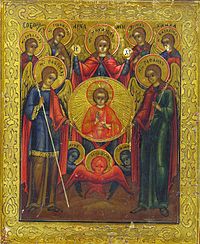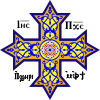Seven Archangels

The concept of Seven Archangels is found in some works of early Jewish literature.
Bible[edit]
The term archangel itself is not found in equivalent in the Hebrew Bible, and in the Greek New Testament the term archangel only occurs in 1 Thessalonians 4:16 and the Epistle of Jude 1:9, where it is used of Michael, who in Daniel 10:13 is called 'one of the chief princes,' and 'the great prince'. In the Septuagint this is rendered "the great angel."[1]
Tobit[edit]
The idea of seven archangels is most explicitly stated in the deuterocanonical Book of Tobit when Raphael reveals himself, declaring: "I am Raphael, one of the seven angels who stand in the glorious presence of the Lord, ready to serve him." (Tobit 12:15) The other two archangels mentioned by name in the Bible are Michael and Gabriel. The four names of the other archangels come from tradition.
1 Enoch[edit]
One such tradition of archangels comes from the Old Testament Jewish apocrypha, the third century BCE Book of the Watchers,[2] known as 1 Enoch or the Book of Enoch, eventually merged into the Enochic Pentateuch.[3][4] This narrative is affiliated with the Book of Giants, which also references the great archangels[5][6] and was made part of the Ethiopian Orthodox Tewahedo Church's scriptural canon. Although prevalent in Jewish and early Christian apostolic traditions and the early Christian Fathers, the Book of Enoch fell from academic and religious status, and by the seventh century was rejected from the canonical scriptures of all other Christian denominations, a banned and unknown work. The various surviving oral traditions recounted many differing lists of archangels.
The names entered Jewish tradition during the Babylonian captivity (605 BCE). Babylonian folklore and cosmology,[7] developing early Mesopotamian beliefs under the dualistic influence of Zoroastrianism, centered around anthropomorphic and zoomorphic representations of stars, planets, and constellations, including the four sons of the Sky Father carrying the Winged Sun, the throne of Wisdom. First the prophet Daniel, then authors such as Ezekiel hebraized this mythology, equating the Babylonian constellations with abstract forms held to be "sons of the gods", angels of the Lord of Israel, and heavenly animal cherubim. The 2 BC Book of the Parables (Ch XL) names the four angels accompanying the Ancient of Days, standing before the Lord of Spirits, "the voices of those upon the four sides magnifying the Lord of Glory": Michael, Raphael, Gabriel, and Phanuel.
The Book of the Watchers (Ch IX) lists the angels who in antediluvian times interceded on behalf of mankind against the rogue spirits termed "the Watchers": Michael, Gabriel, Raphael, and Uriel.
Christian traditions[edit]

The earliest specific Christian references are in the late 5th to early 6th century: Pseudo-Dionysius gives them as Michael, Gabriel, Raphael, Uriel, Camael, Jophiel, and Zadkiel.[8] In most Protestant Christian oral traditions only Michael and Gabriel are referred to as "archangels", which echoes the most mainstream Muslim view, whereas Roman Catholic Christian traditions also include Raphael to complete a group of three.
Lists of characters referred to as "angels" also exist in smaller religious traditions usually regarded as occultist or superstitious. A reference to seven archangels appeared in an 8th or 9th-century talisman attributed to Auriolus, a "servant of God" in north-western Spain. He issues a prayer to "all you patriarchs Michael, Gabriel, Cecitiel, Oriel, Raphael, Ananiel, Marmoniel.[9]
Archangels in current church traditions[edit]

In the Catholic Church, three archangels are mentioned by name in its canon of scripture: Michael, Gabriel, and Raphael. Raphael appears in the deuterocanonical Book of Tobit, where he is described as "one of the seven angels who stand ready and enter before the glory of the lord of spirits",[10] a phrase recalled in Revelation 8:2–6.
Some strands of the Eastern Orthodox Church, exemplified in the Orthodox Slavonic Bible (Ostrog Bible, Elizabeth Bible, and later consequently Russian Synodal Bible), recognize as authoritative also 2 Esdras, which mentions Uriel. The Eastern Orthodox Church and Eastern Catholic Churches of the Byzantine tradition, venerate seven archangels and sometimes an eighth. Michael, Gabriel, Raphael, Uriel, Selaphiel (Salathiel), Jegudiel (Jehudiel), Barachiel, and the eighth, Jerahmeel (Jeremiel) (The Synaxis of the Chief of the Heavenly Hosts, Archangel Michael and the Other Heavenly Bodiless Powers: Feast Day: November 8).[11]
As well as Uriel, the Book of Enoch, not regarded as canonical by any of these Christian churches, mentions (chapter 21) Raguel, Sariel, and Jerahmeel, while other apocryphal sources give instead the names Izidkiel, Hanael, and Kepharel.[12]
In the Coptic Orthodox tradition the seven archangels are named as Michael, Gabriel, Raphael, Suriel, Zadkiel, Sarathiel, and Ananiel.[13][14][15]
In Anglican and Episcopal tradition, there are three or four archangels in the calendar for September 29, the feast of St Michael and All Angels (also called Michaelmas), namely Michael, Gabriel, and Raphael,[16] and often also Uriel.[17][18][19][20][21]
Other ideas[edit]
Although in the Book of Enoch, Ramiel is described as one of the leaders of the 200 Grigori, the fallen angels, the leader is identified as Semjaza. Other names derived from pseudepigrapha and recognized by Eastern Orthodox and Oriental Orthodox churches are Selaphiel, Jegudiel, and Raguel.
In Ismailism, there are seven cherubim, comparable to the Seven Archangels ordered to bow down before Qadar, of whom Iblis refuses.[22]
In Yazidi religion, there are seven archangels, named Jabra'il, Mika'il, Rafa'il (Israfil), Dadra'il, Azrail and Shamkil (Shemna'il) and Azazil, who are emanations from God entrusted with care of the creation.[23]
Seven angels or archangels correspond to days of the week: Michael (Sunday), Gabriel (Monday), Raphael (Tuesday), Uriel (Wednesday), Selaphiel (Thursday), Raguel or Jegudiel (Friday), and Barachiel (Saturday).[citation needed]
Various occult systems associate each archangel with one of the traditional "seven luminaries" (classical planets visible to the naked eye): the sun, the moon, Mercury, Venus, Mars, Jupiter, and Saturn;[24] but there is disagreement as to which archangel corresponds to which body.
According to Rudolf Steiner, four archangels govern the seasons: spring is Raphael, summer is Uriel, autumn is Michael, and winter is Gabriel.[25]
Gallery[edit]
Seven Princes of Heaven: Michael, Gabriel, Raphael, Uriel, Sealtiel, Jehudiel, and Barachiel. Vision of the Blessed Amedeo Menez de Sylva by Pedro Fernández de Murcia, circa 1514.
Raphael, Uriel, Gabriel, Michael, Sealtiel, Jehudiel, and Barachiel. Engraving by Hieronymus Wierix, 16th–17th century.
Gabriel, Michael, Raphael, Selaphiel, Uriel, Barachiel, and Jehudiel. Russian icon, early 1900s.
Michael, Raphael, Jophiel, Gabriel, Zadkiel, Chamuel, and Uriel. Stained-glass window at St Michael and All Angels Church, Warden, Northumberland.
Jehudiel, Uriel, Gabriel, Michael, Barachiel, Raphael, and Sealtiel. Stained-glass windows at St. Michael's Episcopal Church, Manhattan.
Gabriel, Jophiel, Uriel, Michael, Chamuel, Zadkiel, and Raphael. Stained-glass panels at the chapel of Castell Coch, Cardiff.
See also[edit]
- Chakra
- Classical planet
- List of Mesopotamian deities#Seven planetary deities
- Seven churches of Asia
- Seven Factors of Awakening
Notes and references[edit]
- ^ Barker, Margaret (2004). An Extraordinary Gathering of Angels. Publications Ltd.
- ^ Nickelsburg, George W. E. (2001). 1 Enoch 1 : A Commentary on the Book of 1 Enoch, Chapters 1-36; 81-108 (PDF). Minneapolis: Fortress. p. 7.
- ^ VanderKam, James C. (2008) [1995]. Enoch: A Man for All Generations. Columbia: University of South Carolina Press. See also the author's Enoch and the Growth of an Apocalyptic Tradition (1984), published by the Catholic Biblical Association of America: Washington, DC. ISBN 978-1570037962. Italic or bold markup not allowed in:
|publisher=(help) - ^ Barker, Margaret. (2005) [1987]. "Chapter 1: The Book of Enoch," in The Older Testament: The Survival of Themes from the Ancient Royal Cult in Sectarian Judaism and Early Christianity. London: SPCK; Sheffield Phoenix Press.
- ^ Barker, Margaret. (2005) [1998]. The Lost Prophet: The Book of Enoch and Its Influence on Christianity. London: SPCK; Sheffield Phoenix Press. ISBN 1-905048-18-1
- ^ Nibley, Hugh (1986). Enoch the Prophet. Salt Lake City, UT: Deseret Book. ISBN 978-0875790473.
- ^ Encyclopedia, Jewish. "ANGELOLOGY - Angelology systematized". Jewish Encyclopedia.
- ^ A Dictionary of Angels, Including the Fallen Angels by Gustav Davidson, 1980, Free Press Publishing
- ^ Julia M.H. Smith, Europe After Rome: A New Cultural History 500-1000. Oxford: Oxford University Press, 2005. Page 77
- ^ Tobit 12:15
- ^ "Synaxis of the Archangel Michael and the Other Bodiless Powers". oca.org. Retrieved 18 March 2018.
- ^ James F. Driscoll, "St. Raphael" in The Catholic Encyclopedia (New York 1911)
- ^ "2. Intercessors :: The Heavenly Orders Doxology :: ذوكصولوجية للسمائيين". tasbeha.org. Retrieved 18 March 2018.
- ^ Alex, Michael Ghaly -. "رؤساء الملائكة الآخرين - كتاب الملائكة - St-Takla.org". st-takla.org. Retrieved 18 March 2018.
- ^ Ghlay, Michael. "الملائكة.. ما هم، وما هو عدد وأسماء رؤساء الملائكه؟ - St-Takla.org". st-takla.org. Retrieved 18 March 2018.
- ^ Oremus.org website. Retrieved September 15, 2008.
- ^ Saint Uriel Church website patron Saint web page Archived 2015-09-30 at the Wayback Machine. Retrieved September 15, 2008.
- ^ Lesser Feasts and Fasts, p. 380.
- ^ Anglican.org website Michaelmas page. Retrieved September 15, 2008.
- ^ St. George's Lennoxville website, What Are Anglicans, Anyway? page Archived 2008-09-26 at the Wayback Machine. Retrieved September 15, 2008.
- ^ Christ Church Eureka website, September Feasts page Archived 2008-05-11 at the Wayback Machine. Retrieved September 15, 2008.
- ^ Ian Richard Netton Allah Transcendent: Studies in the Structure and Semiotics of Islamic Philosophy, Theology and Cosmology Psychology Press, 1994 ISBN 9780700702879 p. 205
- ^ Adam Valen Levinson The Abu Dhabi Bar Mitzvah: Fear and Love in the Modern Middle East W. W. Norton & Company 2017 ISBN 978-0-393-60837-3
- ^ Morals and Dogma (of the Ancient and Accepted Scottish Rite of Freemasonry) by Albert Pike (1871, 1948, L. H. Jenkins)
- ^ The encyclopedia of angels, p.45, by Rosemary Guiley, Infobase Publishing, 2004.
Further reading[edit]
- Barker, Margaret (2004). An Extraordinary Gathering of Angels. M Q Publications. ISBN 9781840726800
- Barker, Margaret (1992). The Great Angel: A Study of Israel's Second God. London: SPCK; Louisville, KY: Westminster/John Knox Press. ISBN 978-0664253950
- Barker, Margaret (2005) [1998]. The Lost Prophet: The Book of Enoch and Its Influence on Christianity. London: SPCK; Sheffield Phoenix Press. ISBN 1-905048-18-1
- Nibley, Hugh (1986). Enoch the Prophet. Salt Lake City, UT: Deseret Book. ISBN 978-0875790473






